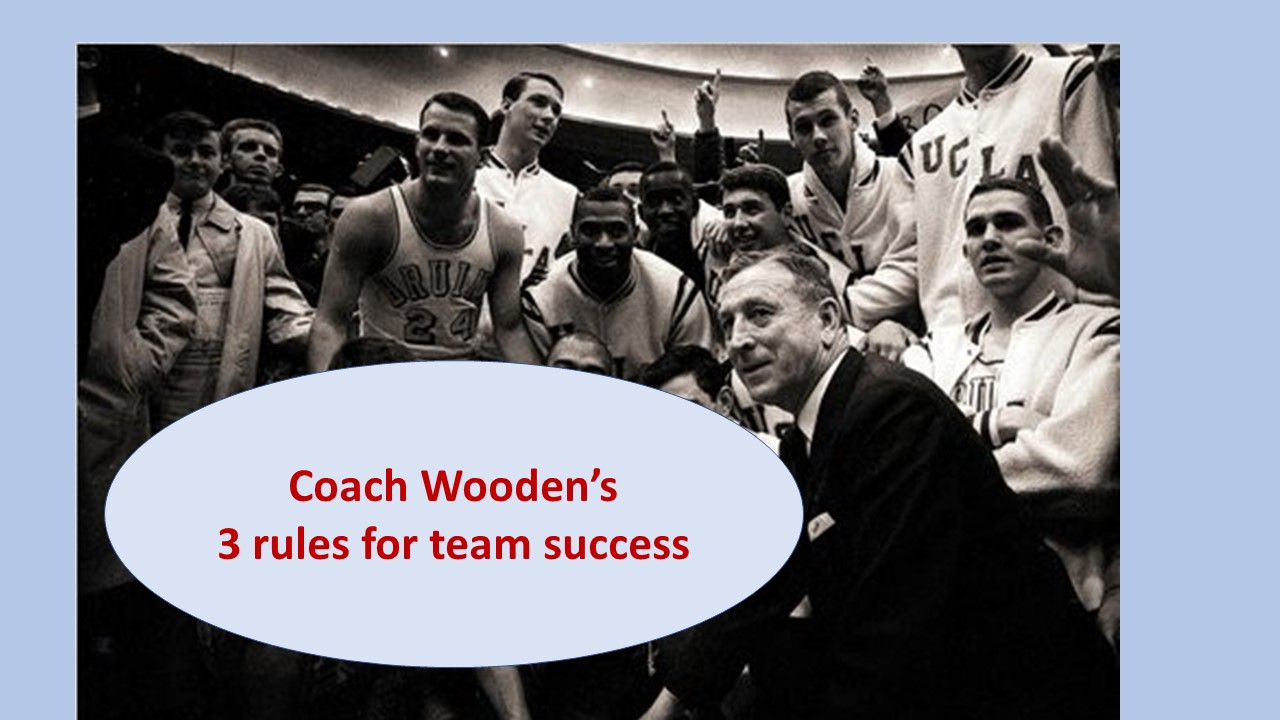Wooden Wisdom:
3 lessons from a coaching legend
By Thomas Davis, CRNA, MAE, DNAP candidate
Follow @procrnatom on twitter
When asked to name the greatest college basketball coach of all time, many would argue that John Wooden has earned the honor. While coaching the Bruins at UCLA (1948-1975), the team made it to the final four 12 times, winning the event an astounding ten times. Even more impressive, he coached the Bruins to four undefeated seasons.
Without a doubt, John was able to recruit and coach talented players, but there was plenty of talent on competing teams. It was The Wizard’s character and leadership that congealed his players into a unified team with a single purpose, setting his program apart from the competition. Knowing that pushing good people to work harder would not deliver the desired results, the coach focused on developing individual talents and taught teamwork that capitalized on those innate abilities.
The legendary John Wooden had 3 rules for his team and they were enforced with integrity every day and in every situation. The same rules that propelled UCLA to basketball fame apply equally in today’s workplace and following them will propel your team to a winning season.
The Wizard’s Wizdom
Rule 1: Never curse. Cursing is an emotional response that results from feeling angry or threatened or when danger is perceived. Wooden allowed only socially acceptable language within his team and taught the players to control their emotions in order to keep “the thinking brain” engaged in the game. Research conducted by George & Dane (2018) affirms that anger undermines good decision-making and must be avoided in the workplace. UCLA’s coach was ahead of the times when he focused on keeping the thinking brain in control. Likewise, applying rules of civility and respect in the workplace eliminates knee-jerk emotional responses and promotes proactive, creative thinking.
Rule 2: Never criticize a team mate. The coach’s ban on criticizing a team mate built an attitude of interdependent collaboration. Nadidah Coveney, of the Forbes coaching council, agrees that collaborative relationships provide a spearhead to success. Tolerating criticism encourages people to see one another as competitors rather than collaborators and, subsequently, to vie for dominance on the team. The superb UCLA teams were expected to see themselves as a single unit in which criticizing a team mate equated with criticizing one’s self. John focused to create teams on which individuals worked to strengthen one another, elevating the entire team. Trust within the Bruins was earned by collaboration, honesty and actively helping one another. Applied in every workplace, a ban on criticizing team mates includes barring gossip and other acts of sabotage that undermine the morale or productivity of the team.
Rule 3: Never be late. Coach Wooden viewed promptness as outward sign of respect for one another. He insisted that practices start on time and, in turn, showed his respect for the group by ensuring that practice ended on time. He believed that sticking with the schedule was evidence of honesty and integrity, both key elements of a trusting environment. Corporate recruiter Chitra Reddy affirms this wisdom by noting that mutual respect enhances collaboration and overall productivity. Team solidarity is created through acts of integrity where members follow through and deliver as promised.
Many work groups are staffed with talented individuals who are competent and capable of doing the assigned job and yet, as with college basketball teams, individual talent may not be enough to win the trophy. Rather than winning with raw talent, the most successful teams win through collaborative team work. Following John Wooden’s three rules of controlling emotions, working collectively, and building trust through respect will enable a slam dunk for success. Now get out there and crash the boards!
Tom is a noted author, speaker and avid advocate
for healthcare leaders.

